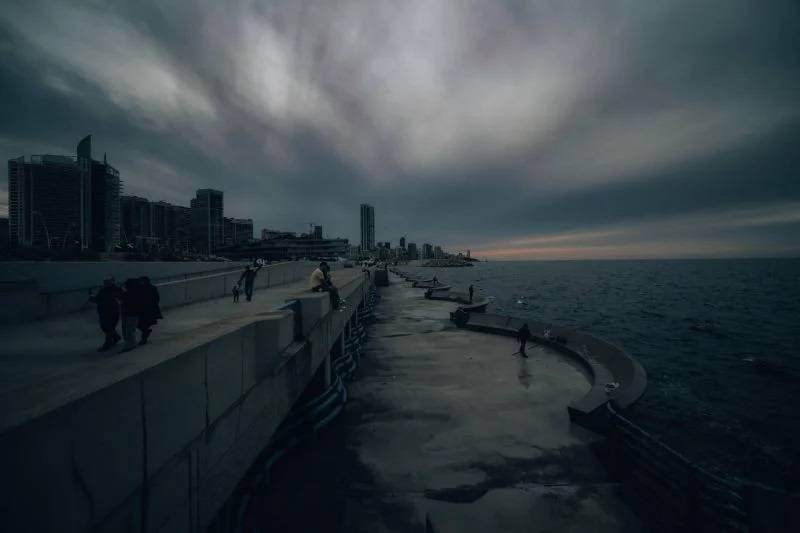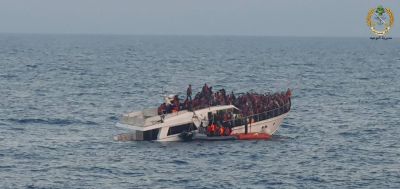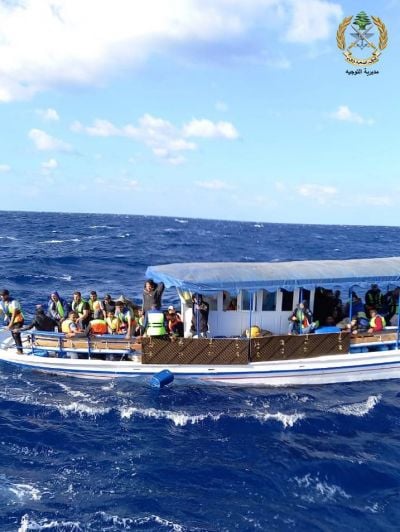
The seafront in Beirut. (Credit: João Sousa/L'Orient Today/File photo)
BEIRUT — The number of migrants attempting life-threatening informal sea journeys from Lebanon to Europe has increased this summer season, after a low at the beginning of the year, UNHCR Lebanon spokesperson Lisa Abou Khaled told L'Orient Today.
She pointed to Lebanon's crippling economic crisis that started in 2019, among other factors, for the uptick in dangerous sea migration attempts.
The boat journeys continue despite a spate of deadly shipwrecks off the coast of Lebanon and Syria over the past year in which dozens have died on what the UN's migration agency calls the "most dangerous migration route in the world."
"The economic crisis in Lebanon has resulted in a sharp deterioration of the situation of both Lebanese [citizens] and refugees, increasing humanitarian needs and negative coping mechanisms for everyone," Abou Khaled explained.
"Half of the Lebanese population live now below the poverty line, and 90 percent of Syrian refugee families need humanitarian assistance to survive."
However, she added that "while the number of reports was low at the beginning of the year, they have since picked up as the warmer season started – with four reports of boat departures in May alone.
"Overall, numbers of boat movements in 2023 are down on last year – in terms of both numbers of boats and passengers."
"In January-July 2022, there were 14 boats with 1,082 passengers, compared to the same period this year where there were 10 boats, with 535 passengers. Profiles remain the same – overwhelming majority of passengers are Syrian," according to Abou Khaled.
The passenger breakdown in 2022 was mixed in terms of nationalities, but Syrians remain the highest cohort, the UN agency said. In 2022, 66 percent of would-be migrants were Syrians, 24 percent were Lebanese, and 10 percent were Palestinians, according to UNHCR figures.
From January to December 2022, the UN agency said it has received reports of 51 boats involved in irregular transit from Lebanon, with 4,334 passengers on board.
'Current approach to the Mediterranean is unworkable'
The Lebanese Army and security forces have foiled at least four irregular sea migration attempts so far in July alone.
The most recent one took place on Thursday, in which the Lebanese Army and security forces halted an irregular migrant boat from taking to sea off the coast of Abdeh in Akkar governorate.
On July 8, the Internal Security Forces (ISF) said they arrested more than 200 Syrians and several Lebanese citizens in northern Lebanon as they were preparing to set out in irregular migration boats to Italy, while the army announced that it had arrested five people smugglers and 49 Syrians in Deir Ammar who were also on their way to migrate to Europe by sea.
The ISF added that they also arrested that day nine alleged people smugglers who had attempted to transport hundreds of people off the coast of Selaata in Batroun. Each would-be passenger had been charged between $6,000 to $7,000 for the attempted crossing to Italy.
A spokesperson for the ISF told L'Orient Today that sea migration attempts departing from Lebanese shores are "usually expected to increase during this period."
According to recent figures released by the United Nations International Organization for Migration (IOM), last year 3,800 people died on migration routes within and from the Middle East and North Africa — the highest number since 2017.
The IOM noted, in a joint statement along with the UNHCR, that irregular migration attempts departing from Lebanon made up nearly half of the 378 deaths on the Eastern Mediterranean route in 2022.
Irregular departures from Lebanon’s shores more than doubled for a second year in 2022 amid increasingly dire living circumstances.
In an IOM report, Federico Soda, the Director of the Department of Emergencies at IOM, said: “It is clear that the current approach to the Mediterranean is unworkable. Year after year, it continues to be the most dangerous migration route in the world, with the highest fatality rate."
He also emphasized the necessity for states to unite and address the deficiencies in proactive search and rescue, swift disembarkation and establishing safe regular pathways.
In the joint statement, UNHCR and IOM underscored that the current approach to Mediterranean Sea crossings was “unworkable."
UNHCR's Turkey's representative also urged the European Union to prioritize "safety and solidarity" as the core principles guiding its actions in the Mediterranean.
Additional reporting by Layal Dagher.

